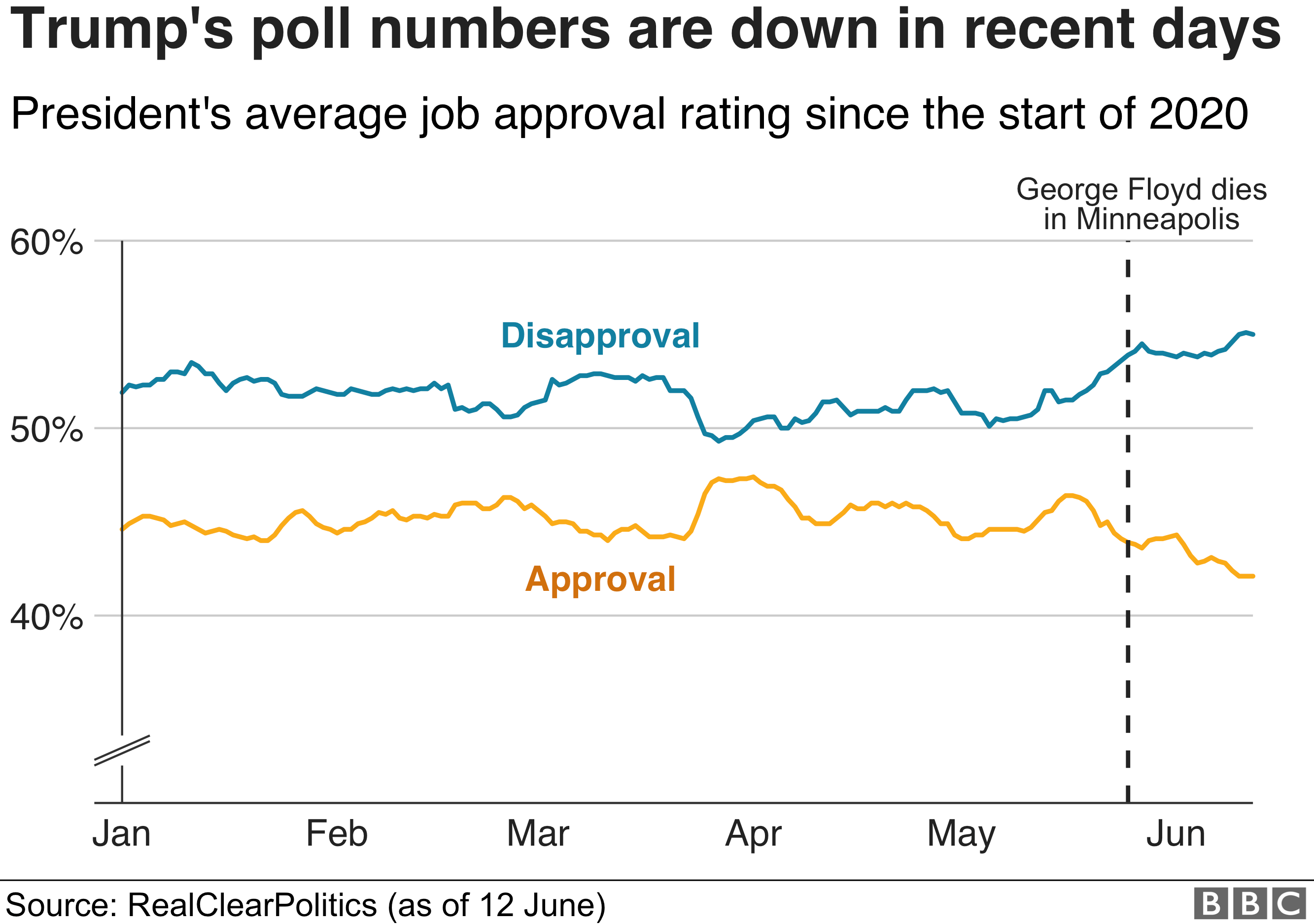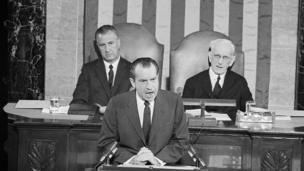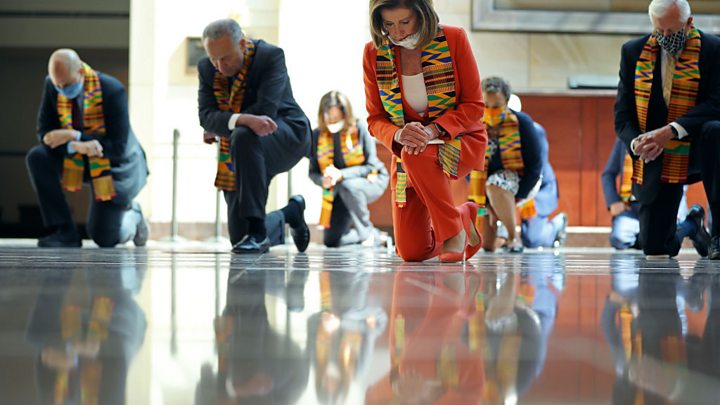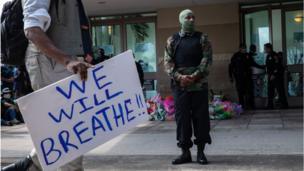George Floyd death: Is Trump in trouble for stance on US race relations?
It's been a rough few weeks for Donald Trump. A spate of polls with bad news, reports of turmoil in his campaign. And his presidency has been beset by a seemingly interminable series of crises. Is his re-election bid in serious peril?
Donald Trump is an instinctual politician. Four years ago, he jumped into the deep end of the electoral pool and - defying all expectations and predictions - won his party's presidential nomination and, subsequently, the White House.Such a feat, needless to say, would give a person a high regard for his own judgement. In hindsight, it would be easy for Trump to see a clear line from his descent on that golden escalator in July 2015 through all the controversies, name-calling, feuding, intemperate tweeting and associated drama, to his come-from-behind victory in November.
The experts were wrong. He was right.

Trump was certainly right about the big things. He ran as an outsider during an election where the national mood was tilted against the political establishment. He sensed this and capitalised on it, but his success may have glossed over any mistakes or missteps made along the way.
Fast forward four years, and the president's instincts this time around may be betraying him. He appears to want a replay of his 2016 victory - painting himself as the anti-establishment candidate doing battle with a "Washington swamp" opponent. His moves cater to his political base, which worked to his advantage last time because it drove up his side's turnout in key states, while on-the-fence voters and traditional conservatives gave him the benefit of the doubt.
The undecided voters, when they cast their ballots, broke decidedly in his fav
faow, however, Trump is a known quantity. His loyal base - which appears to be between 30% and 40% of the electorate, according to polls - will not be enough if he continues to haemorrhage support from the elderly, educated suburban residents and religious voters.
The moves the president has made, however, have been out of the 2016 playbook - stoking controversy, instigating fights over social issues, advancing conspiracy theories and "counter-punching" to any and all criticism.
Percentage of Americans who say racial discrimination is a ‘big problem’ indicate the president is trailing Biden - by double digits in some surveys. A recent Economist magazine analysis gives Biden a five in six chance of winning by an electoral margin reminiscent of Barack Obama's comfortable win in 2008.
The president is touting "law and order" at a time when public opinion has dramatically shifted in favour of the Black Lives Matter movement and toward the belief that racial and ethnic discrimination is a real problem that will be a priority when voting in November.
 Image copyrightBETTMANN
Image copyrightBETTMANNA "law and order" campaign may have been Richard Nixon's key to presidential victories during years of civil unrest in the late 1960s and early 1970s, but this is not the same nation it was 50 years ago.
Just a few episodes over the past few weeks reveal the current political state of play.
On Thursday, Trump emphatically ruled out removing the names of Confederate generals from 10 US military bases in the south, saying it disrespected the soldiers trained there.
At the same time, the Nascar car-racing circuit - which started in the south and is hugely popular there - announced it was banning the display of the Confederate flag from all its events. Local and state leaders have taken steps to remove Confederate statues, and the call for the base name change came from within the ranks of the US military, most notably in an Atlantic Magazine essay by retired General David Petreaus.

Media caption Democrats kneel in moment of silence for George Floyd
The ground is shifting in another cultural fight the president has relished in the past, over professional athletes kneeling during the national anthem to protest unjust policing practices. The National Football League has officially expressed regrets over not supporting its players who took part in such protests, including former quarterback Colin Kaepernick.
The US Soccer Federation voted on Wednesday to repeal a requirement that all players "stand respectfully" during the national anthem. Democrats, who shied away from the controversy, are now kneeling in solidarity. Meanwhile, Trump continues to condemn the practice - and took aim at the NFL and quarterback Drew Brees after he recently apologised for calling the kneeling unpatriotic.

Just under two weeks ago, law enforcement and National Guard troops forcibly cleared a park by the White House shortly before the president walked to a nearby church and posed for photographers with a Bible. Since then, he has continued to defend the move, noting how easy it was for the security forces to clear the park's occupants.
"A walk in the park," he tweeted.
 Image copyrightGETTY IMAGES
Image copyrightGETTY IMAGESMeanwhile, civilian leaders and uniformed members of the US military have been distancing themselves from the incident. Numerous retired generals, including former Defence Secretary James Mattis, have called the actions reckless. Both current Defence Secretary Mark Esper and Joint Chiefs of Staff Chair Mark Milley have expressed regret over accompanying Trump in his walk to the church.
The New York Times reports widespread unease among the National Guard members dispatched to provide security in Washington DC last week.
Perhaps the most jarring episode, however, involved the president alleging in a tweet that a 75-year-old protester video recorded being shoved to the ground and left bleeding from his head by Buffalo, New York, police was a radical leftist saboteur attempting to conduct electronic surveillance of law enforcement. The allegation, drawn from far-right fringe media, left many of the president's Republican supporters pleading ignorance or disavowing the tweet.
It has left some wondering whether the president, through his actions and inactions, but mostly through the way he has conducted himself during a time of crisis, has created an insurmountable obstacle to his re-election.
 Image copyrightGETTY IMAGES
Image copyrightGETTY IMAGES"If he loses in November, it won't because he pursued a big legislative reform that was a bridge too far politically," writes Rich Lowery, editor of the conservative National Review in Politico magazine.
"It won't be because he adopted a creative and unorthodox policy mix that alienated his own side. It won't even be because he was overwhelmed by events, challenging though they've been. It will mostly be because he took his presidency and needlessly drove it into the ground, 280 characters at a time."
It is still more than four and a half months until the presidential election - a lifetime in ordinary political terms and a near-eternity in the current environment. There is still the possibility that Trump can find his footing, or Biden can catastrophically lose his.
The Democrat's lead over Trump so far, however, has been durable - more so than Hillary Clinton's in 2016. The president's standing may be at an ebb after several weeks of bad news, but his highs haven't been high enough to make him a favourite.
For the president to have a result similar to 2016, he may have to abandon his 2016 outlook and convince Americans that he can be more than the president they have now, but rather the one they would want for the next four years.



Comments
Post a Comment